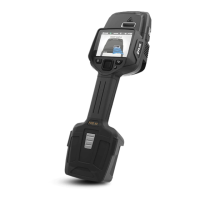4226044 (Rev. C) © 2020 FLIR Systems, Inc.
19
FLIR Fido® X4 Operations Manual
3.5.1 Sensing element
Caution: To avoid burns, when handling the sensing element, take care only
to touch the end of the element that is marked with a dot. See Figure 3-4.
Caution: Breaking a sensing element will create sharp edges and glass shards
that can cut or puncture skin.
• Do not store sensing elements in clothing pockets.
• Do not put a sensing element where someone might sit or step on it.
• Properly dispose of used or broken sensing elements with care to avoid
injury.
Figure 3-4: Sensing element (dot enlarged)
The Fido X4 sensing element contains the highly sensitive and selective fluorescent and
chemiluminescent sensing materials that make-up TrueTrace technology. During operation,
the unmarked end of the sensing element is inserted into the thermal desorber and heated.
The foundation of the sensing element is an optical-grade glass capillary tube. Sensing mater-
ials are applied as thin films, in a linear, 5-channel array, inside of the capillary. Multiple vari-
ations of these novel materials are used to achieve sensitivity and selectivity across a broad
range of threat materials, including:
• nitroaromatics
• nitrate esters
• nitramines
• nitrosamines
• inorganic nitrate
• nitro-volatiles
• peroxides
Periodically, the sensing element must be replaced.During operation of the Fido X4, system
diagnostics continually monitor sensor array performance to determine when replacement is
needed.When the system determines that the sensing element must be replaced, simple
prompts are displayed to inform the user. For more information, see "Replacing the Sensing
Element" on p. 53.

